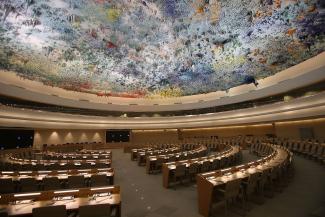The Human Rights Council (HRC) is the foremost intergovernmental body responsible for the promotion and protection of all human rights around the globe.
The 50th session of the UN Human Rights Council takes place from 13th June 2022 - 8 July 2022, in Geneva.
The HRC is presented with thematic and country reports from UN experts and is where Member States debate and pass resolutions on cross-cutting human rights issues and human rights situations in particular countries.
Find below information on key reports and resolutions related to gender justice, sexuality and women's rights, as well as statements made by feminist activists and civil society on restrictions to civil society participation this session.
Key Reports at the 50th Session

Key Reports at the 50th Session
-
'Girls and young women’s activism,’ Report of the Working Group on discrimination against women and girls (to be shared when available)
-
‘Violence against indigenous women and girls,’ Report of the Special Rapporteur on violence against women, its causes and consequences A/HRC/50/26
-
‘The realization of the right to health in relation to Sustainable Development Goal No. 3,’ Report of the Independent Expert on protection against violence and discrimination based on sexual orientation and gender identity A/HRC/50/26
-
‘The right of internally displaced persons to participate in electoral processes, particularly the right to vote and to stand in elections,’ Report of the Special Rapporteur on the human rights of internally displaced persons A/HRC/50/24
-
‘Violence and its impact on the right to health,’ Report of the Special Rapporteur on the right of everyone to the enjoyment of the highest attainable standard of physical and mental health A/HRC/50/28
-
‘Reinforcing media freedom and the safety of journalists in the digital age,’ Report of the Special Rapporteur on the promotion and protection of the right to freedom of opinion and expression A/HRC/50/29
-
‘Human rights violations at international borders: trends, prevention and accountability,’ Report of the Special Rapporteur on the human rights of migrants A/HRC/50/31
-
‘Impact of the digitalization of education on the right to education,’ Report of the Special Rapporteur on the right to education, Koumbou Boly Barry A/HRC/50/32
-
‘Trafficking in persons in the agriculture sector: human rights due diligence and sustainable development’ Report of the Special Rapporteur on trafficking in persons, especially women and children A/HRC/50/33
-
‘International solidarity and the extraterritorial application of human rights: prospects and challenges,’ Report of the Independent Expert on human rights and international solidarity A/HRC/50/37
-
‘Non-take-up of rights in the context of social protection,’ Report of the Special Rapporteur on extreme poverty and human rights A/HRC/50/38
-
‘High-level panel on the multisectoral prevention of and response, including the global response, to female genital mutilation,’ Report of the United Nations High Commissioner for Human Rights A/HRC/50/46
Key statements
- Joint statement on young women and girls’ activism
Resolutions
-
Elimination of discrimination against women and girls (led by Mexico, Argentina and Chile) A/HRC/50/L.22/Rev.1
-
Mandate of the Special Rapporteur on violence against women and girls, its causes and its consequences (led by Canada) A/HRC/50/L.7.
-
Access to medicines, vaccines and other health products in the context of the right of everyone to the enjoyment of the highest attainable standard of physical and mental health (led By Brazil, China, Egypt , India, Indonesia, Senegal, South Africa, Thailand) A/HRC/50/L.13/ Rev.1
-
Elimination of Female Genital Mutilation (led by CÔTE D'IVOIRE (on behalf of Group of African States) A/HRC/50/L.15/Rev.1
-
Mandate of the Independent Expert on protection against violence and discrimination based on sexual orientation and gender identity (led by Uruguay , Argentina, Brazil, Chile, Colombia, Costa Rica, Mexico) A/HRC/50/L.2
-
Enhancement of international cooperation in the field of human rights (led by Azerbaijan on behalf of the Movement of Non-Aligned Countries) - A/HRC/50/L.1
-
Independence and impartiality of the judiciary, jurors and assessors, and the independence of lawyers - Participation of women in the administration of justice (Hungary, Australia, Botswana, Maldives, Mexico and Thailand) - A/HRC/50/L.3
-
Mandate of the Special Rapporteur on the human rights of internally displaced persons (Austria, Honduras, Uganda) - A/HRC/50/L.4
-
The Social Forum (Cuba) - A/HRC/50/L.8
-
Human rights and international solidarity (Cuba) - A/HRC/50/L.9
-
Human Rights and climate change (Bangladesh, Philippines, Viet Nam) - A/HRC/50/L.10/Rev.1
-
Freedom of opinion and expression (Canada, Brazil, Fiji, Namibia, Netherland and Sweden) - A/HRC/50/L.11
-
Human rights and the regulation of civil acquisition, possession and use of firearms (Ecuador, Peru) - A/HRC/50/L.12
-
The promotion and protection of human rights in the context of peaceful protests (Switzerland, Costa Rica) - A/HRC/50/L.16
-
The rights to freedom of peaceful assembly and of association (Czechia, Indonesia, Lithuania, Maldives, Mexico, United States of America) - A/HRC/50/L.20